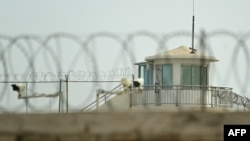The United States continues efforts to halt the flow of goods made with what it says is the use of forced labor in China’s northwestern Xinjiang Uyghur Autonomous Region.
On November 22, the U.S. Department of Homeland Security announced it had added 29 more Chinese companies to the Uyghur Forced Labor Prevention Act, or UFLPA, Entity List, bringing the number of blacklisted firms to 107. U.S. President Joe Biden signed the UFLPA into law in December 2021.
“Today’s enforcement actions make it clear — the United States will not tolerate forced labor in the goods entering our markets,” said the under secretary for policy, Robert Silvers, who serves as chair of the Federal Labor Enforcement Task Force.
China’s Ministry of Commerce, MOFCOM, responded to the sanctions by accusing the U.S. of using the human rights situation in Xinjiang as a pretext for bullying and economic coercion.
“The [MOFCOM] spokesperson emphasized that China is firmly opposed to ‘forced labor’ in any form and there is no forced labor in Northwest China's Xinjiang Uygur Autonomous Region,” the Chinese Communist Party’s Global Times newspaper reported on November 26.
“The US, without any credible evidence, uses its domestic laws to impose sanctions simply because Chinese companies source materials from Xinjiang region or employ Xinjiang workers.”
That is false.
The United Nations Human Rights Council’s special rapporteur, Tamoya Obokata, concluded in August 2022 that the Chinese government has been subjecting ethnic minorities in Xinjiang to forced labor.
"Based on an independent assessment of available information, including submissions by stakeholders, independent academic research, open sources, testimonies of victims, consultations with stakeholders, and accounts provided by the Government, the Special Rapporteur regards it as reasonable to conclude that forced labour among Uighur, Kazakh and other ethnic minorities in sectors such as agriculture and manufacturing has been occurring in the Xinjiang Uighur Autonomous Region of China,” Obokata reported.
Subsequent reports have added to the body of evidence proving allegations that China is not only continuing but expanding its use of forced labor in Xinjiang.
In October, the Washington-based Center for Advanced Defense Studies, or C4ADS, a research group, reported the use of Uyghur forced labor in China’s pharmaceutical industry.
C4ADS said Chinese pharmaceutical companies had committed a number of abuses in Xinjiang. The alleged abuses include involvement in coercive land transfer programs, using Uyghur and Kazakh forced labor in the manufacture of pharmaceutical products, and subjecting Uyghurs to non-consensual drug testing and medical procedures.
The report cited testimony by Qelbinur Sidiq, a self-described “victim of China’s concentration camp,” provided to the London-based Uyghur Tribunal in 2021.
Sidiq said authorities gave detainees shots to stop their menstrual cycles, and made them take random medicines, which also controlled their cycles.
“Some inmates experience side effects like severe bleeding from the shots and pills,” Sidiq said.
That testimony fits into broader allegations that China has pursued a state-backed sterilization program targeting Uyghur women, which critics say meets the United Nations’ definition of genocide.
C4ADS reported that 76 pharmaceutical products exported from China were produced only in Xinjiang, warning the world is dependent on "many critical pharmaceutical products” manufactured there.
C4ADS said none of the 43 licensed pharmaceutical companies, which produce 661 products in Xinjiang, appeared on the UFLPA list.
C4ADS said at least two Xinjiang-based pharmaceutical companies are registered with the U.S. Food and Drug Administration, meaning, “these companies are authorized to import to the United States.”
C4ADS said under the UFLPA, it is assumed that any goods made in Xinjiang were done so with forced labor, prohibiting their entry into the U.S.
The DHS only added one pharmaceutical company to the UFPLA Entity List last month — Sichuan Yuanan Pharmaceutical Co. No other pharmaceutical firm appears on the list.
Meantime, a February report from Adrian Zenz, a researcher who has written extensively about China’s Uyghurs, found that Beijing was expanding its Poverty Alleviation Through Labor Transfer program. That program has allowed Beijing to continue its use of forced labor without necessarily subjecting Xinjiang residents to forced internment, a practice which has drawn global condemnation.
Zenz said China will continue to expand its forced labor transfer program next year, in line with Xinjiang’s 14th Five-Year Plan for Employment Promotion.
In a June 2022 report, Zenz argued that “Xinjiang’s labor transfers became highly coercive” at the same time as the mass internment program for Uyghurs began in 2017.
Beijing has consistently attacked Zenz as “a right-wing Christian” looking to slander the Chinese Communist Party. China sanctioned Zenz in 2021 for severely harming “China's sovereignty and interests.”
C4ADS cited Zenz in their report. So did Obokata, the U.N. special rapporteur on contemporary forms of slavery.
Obokata’s report cited abuses in the agriculture and manufacturing sectors, saying Chinese authorities had subjected workers to “excessive surveillance, abusive living and working conditions, restriction of movement through internment, threats, physical and/or sexual violence and other inhuman or degrading treatment.”
Those abuses, in some instances, “may amount to enslavement as a crime against humanity,” the report said.
Independent experts and media say China, a global leader in cotton production, has forced Uyghurs and other ethnic minorities to pick cotton in Xinjiang.
Researchers have uncovered similar evidence implicating China’s solar power industry.
Approximately two weeks after the release of Obokata’s report, the United Nations High Commissioner for Human Rights released a comprehensive report on the treatment of Uyghurs and other largely Muslim groups in China.
That report said there are indications China’s labor and employment schemes “appear to be discriminatory in nature or to involve elements of coercion.”
The report similarly concluded that Chinese authorities may be engaged in crimes against humanity in Xinjiang.








